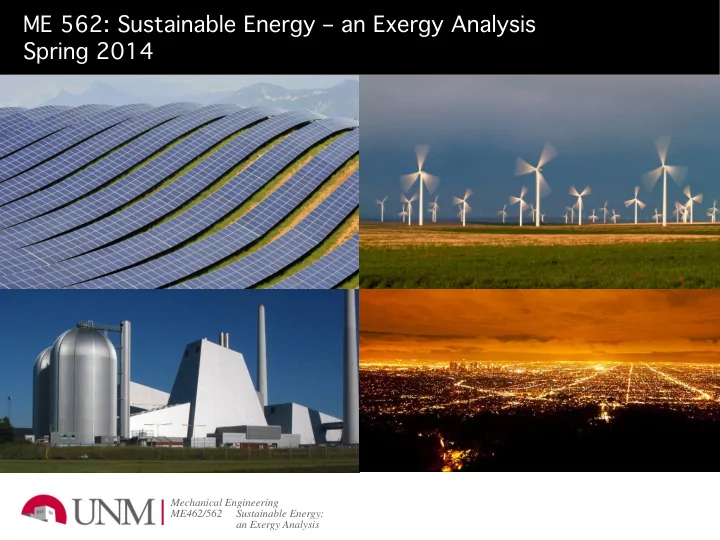

ME 562: Sustainable Energy – an Exergy Analysis Spring 2014 Mechanical Engineering ME462/562 Sustainable Energy: an Exergy Analysis
About the instructor Prof. Andrea Mammoli Offjce: ME436A (4th fmoor, southwest corner of ME building) T: 2779215 W: http://www.me.unm.edu/~mammoli/me562.html E: mammoli@unm.edu Offjce hours: by appointment Mechanical Engineering ME462/562 Sustainable Energy: Introduction - I 2/15 an Exergy Analysis
Course syllabus – subject to change 0. Introduction and motivation 9. Renewable energy systems 1. Thermodynamics review 10. Steam power plants 2. Exergy vs. energy analysis 11. Cogeneration and district energy systems 3. Exergy, environment & sustainability 12. Fuel cells 4. Exergy in policy development & 13. Exergoeconomics of thermal education systems 5. Industrial applications 14. Exergy analysis of countries, regions and economic sectors 6. Evaporative processes 15. Exergetic life cycle assessment 7. Heat pumps 16. Exergy and industrial ecology 8. Thermal storage systems Mechanical Engineering ME462/562 Sustainable Energy: Introduction - I 3/15 an Exergy Analysis
Main reference book Exergy: Energy, Environment and Sustainable Development. Ibrahim Dincer & Mark Rosen. Second Edition, 2013 Elsevier Not required – the class will primarily be based on scientifjc papers obtainable from UNM libraries Mechanical Engineering ME462/562 Sustainable Energy: Introduction - I 4/15 an Exergy Analysis
Other references MacKay, D. Sustainable Kreith, F. and Kreider, J. Energy Without the Hot Air. Principles of Sustainable UIT Cambridge UK 2009. Energy. CRC Press 2011 Download free pdf at http://www.withouthotair.co m/ or buy paper copy Mechanical Engineering ME462/562 Sustainable Energy: Introduction - I 5/15 an Exergy Analysis
Assessment ● Homework 10% ● Projects 50% ● Midterm test 15% ● Final test 25% Mechanical Engineering ME462/562 Sustainable Energy: Introduction - I 6/15 an Exergy Analysis
Energy and economy The human development ● index (HDI) measures standard of living HDI goes up with energy ● consumption, but with diminishing returns > 50 GJ/year/capita of ● energy use produces a good standard of living Energy consumption of ● human body at rest: 100W or 3.15 GJ / year Mechanical Engineering ME462/562 Sustainable Energy: Introduction - I 7/15 an Exergy Analysis
HDI around the world http://hdr.undp.org/en/data/map/ Mechanical Engineering ME462/562 Sustainable Energy: Introduction - I 8/15 an Exergy Analysis
Energy and GDP Mechanical Engineering ME462/562 Sustainable Energy: Introduction - I 9/15 an Exergy Analysis
Energy and life metrics Mechanical Engineering ME462/562 Sustainable Energy: Introduction - I 10/15 an Exergy Analysis
The fjnite nature of fossil reserves Underlying global demand for energy by ● 2050 could triple from its 2000 level if emerging economies follow historical patterns of development. Ordinary rates of supply growth -- ● taking into account technological, geological, competitive, fjnancial and political realities -- could naturally boost energy production by about 50%. This gap – this Zone of Uncertainty – will ● have to be bridged by some combination of extraordinary demand moderation and extraordinary production acceleration. So, we must ask: Is this a Zone of Extraordinary Opportunity or Extraordinary Misery? http://www.shell.com/home/content/future_energy/scenarios/ Mechanical Engineering ME462/562 Sustainable Energy: Introduction - I 11/15 an Exergy Analysis
Climate change and energy use Energy is not the only GHG emitter, but certainly it is the biggest. Mechanical Engineering ME462/562 Sustainable Energy: Introduction - I 12/15 an Exergy Analysis
The macro energy budget Total 99.75 quads (10 15 Btu) or 29.2 x 10 12 kWh Mechanical Engineering ME462/562 Sustainable Energy: Introduction - I 13/15 an Exergy Analysis
A micro energy budget Mechanical Engineering ME462/562 Sustainable Energy: Introduction - I 14/15 an Exergy Analysis
Richard Feynman on energy: There is a fact, or if you wish, a law governing all natural phenomena that are known to date. There is no known exception to this law – it is exact so far as we know. The law is called the conservation of energy. It states that there is a certain quantity, which we call “energy,” that does not change in the manifold changes that nature undergoes. That is a most abstract idea, because it is a mathematical principle; it says there is a numerical quantity which does not change when something happens. It is not a description of a mechanism, or anything concrete; it is a strange fact that when we calculate some number and when we fjnish watching nature go through her tricks and calculate the number again, it is the same. It is important to realize that in physics today, we have no knowledge of what energy “is.” We do not have a picture that energy comes in little blobs of a defjnite amount. It is not that way. It is an abstract thing in that it does not tell us the mechanism or the reason for the various formulas. Mechanical Engineering ME462/562 Sustainable Energy: Introduction - I 15/15 an Exergy Analysis
Recommend
More recommend